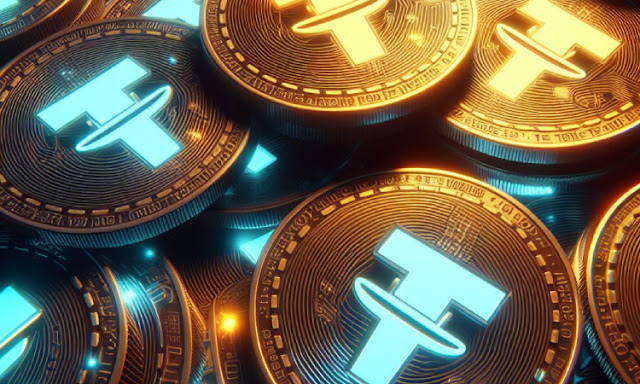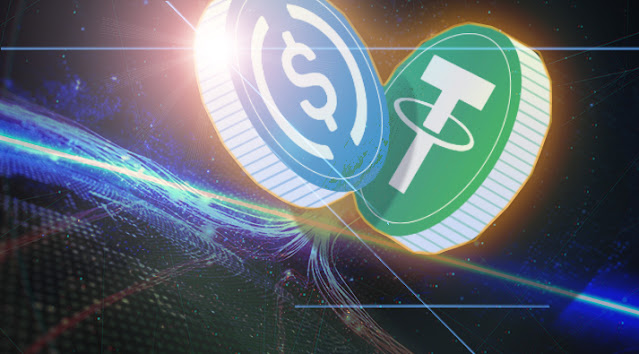If you've been watching the numbers, you knew this day was coming for awhile now.
About a month ago my colleague from our New York News Desk published an end-of-the-year report on the overall increased usage of stablecoins, which is when I learned things had begun rapidly accelerating towards the end of 2021.
Things were looking worse for USDT than expected...
"...upon closer inspection you'll notice that the current top stablecoin, USDT (Tether) is actually declining in popularity - beginning the year holding about 75% of the entire stablecoin market, and ending it closer to 50%."
While USDC's growth was actually a bit shocking...
"USDC didn't just hold on to it's rank as 2nd most popular - while the total ecosystem grew by about 4X compare to last year, USDC saw growth of nearly 10X - from a $4 billion marketcap to $41 billion!"So with USDT ending 2021 with 'closer to 50%' of the stablecoin market, still a majority - it only took a couple weeks of continuing decline until we arrive here.
On the Ethereum a Blockchain Tether's $39.8 Billion Market Cap Not Enough To Hold #1 Spot, USDC's $40.1 Billion Takes Over...
Making USDC the most used stablecoin on the most used protocol (ether). While USDT still has a larger cap when looking at totals across all chains, the stats show the same reversal is coming to every protocol.
Which actually makes this a truly historic day in crypto.
USDT is the original stablecoin, going all the way back to 2014 where it first launched as 'Realcoin'.
After a couple years where people generally assumed things were as they seem, we began to see what would grow in to a 'movement' starting on Twitter, made up of people that found it suspicious Tether wouldn't say what banks held the reserve funds needed to back up their 1:1 value with the US Dollar.
Then Things Got Crazy... Tether and their supporters initially claimed they did have the funds, sitting in bank accounts around the world in order to spread the risk.
That alone isn't suspicious - remember this is 2017-2018, crypto is exploding but it's still the wild west on steroids. This is the days when if you heard the word 'Bitcoin' come out of your TV is was likely a news report on how people buy illegal drugs and guns online.
The general public having a major misconception of crypto made it a realistic concern that any government could suddenly freeze an account that's holding millions of dollars if learned the money was somehow connected to crypto.
Even Binance CEO CZ came out to say he believes Tether's reasoning for the secrecy, saying;
"I think the reason they cannot release their bank account details is because if they release whichever bank they’re using, then the bank account gets shut down”
Ironically, even though Tether had a legitimate reason to not publicly share where the funds are located (in my opinion), it would turn out they were also lying about how much they had.
The next couple years were basically chaos - in 2018 I
reported on Tether being accused of faking a hack in order to explain $31 million in missing funds.
In 2019 the New York Attorney General began investigating Tether, also suspicious if they held enough reserve cash in banks to back the all of the crypto-coins in circulation. After recieving documents from Tether, but not what they asked for, the Attorney General said the results were inconclusive.
That's when the CFTC took over, Tether eventually admitted they do not hold $1 USD for every 1 USDT - however they then claim some of the reserves is in other types of assets and investments, and the total value covers the coins minted.
If you don't find that comforting, neither did the US Government - Tether was ordered to pay a $41 million fine to the Commodity Futures Trading Commission in 2021.
With All That In Mind - It's No Surprise The Crypto World Accepted USDC's Offer Of a Fresh Start for Stablecoins, Minted From An An Always Open Platform...
USDC Coins are minted via a consortium called Centre, where USD needs to be transferred from a bank before any additional USDC is created. Behind Centre are well known, generally trusted companies like Coinbase, Circle and Bitmain.
USDC also undergoes a monthly review from accounting firm Grant Thornton, whos reports are
publicly posted.
In Closing...
Why Tether chose to operate the way they did will always be a mystery - nothing is stranger than stories where a company would make more money by being honest.
All stablecoins do the same thing, so it's hard a one coin that's always worth $1 to convince people to use theirs instead of another that does the exact same thing.
So with a monopoly on the market, Tether decided to give people a reason to choose an alternative - which they clearly have done.



